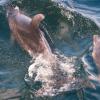Technical Report On Socioeconomic Monitoring In Cades Bay Marine Reserve Antigua And Barbuda
A healthy environment is the primary basis for the economically critical tourism and fishing
industries in the Caribbean. However, these indust ries, coupled with trad itional settlement and
development activities, are exerting major influences on the complex mixture of sensitive
ecosystems that comprise the Caribbean coastal zone. Awareness of the economic and social
value of the marine environment and the coas tal areas, and acknowledgment of the need to
protect and preserve sensitive ecosystems, part icularly coral reefs, has led each Caribbean
country to establish marine protected areas or re serves. These areas are useful tools, not only for
protecting and conserving threat ened coastal and marine areas, but also for the direct
involvement of local communities in the management and by channelling some of the economic
benefits from the tourism industry to the local communities, thereby allowing them to directly
benefit from it and creating incentives to preserve the environment.
Poor fishing and land use prac tices, coastal development, an d numerous other threats are
increasing the pressures on coral reef health. These threats can be mitigated with appropriate
management practices that benefit conservation and management of coral reefs. However,
altering practices that are harmful to coral reefs is often difficult because the various ways in
which people utilize their natural resources are invariably related to a multitude of social,
cultural, and economic factors. Coastal resource managers cannot limit themselves to managing
reefs from only a biophysical standpoint, but must include socioeconomic factors. It is essential
to understand how stakeholders use and perceive coastal resources prior to attempts to involve
local people in community-based or co-management efforts. Gaining an understanding of the
socioeconomic factors driving resource use can allow resource managers to identify root causes
of resource degradation and adap t management strategies to refl ect the needs and desires of the
stakeholders.
The findings from socioeconomic monitoring can be used to improve future reef management
strategies. Understanding how socioeconomic factors influence resource us e can assist resource
managers in identifying root causes of envir onmental problems and help efficaciously apply
limited funds by adapting project activities to local conditions. Managers can use the
information to demonstrate to the public and policy makers the importance of protecting the
natural environment including co ral reefs, and to support th eir actions in planning new
management policies.
Area of Interest: Antigua
Year: 2017




